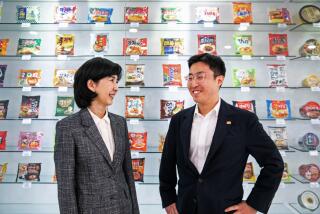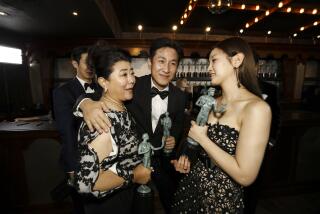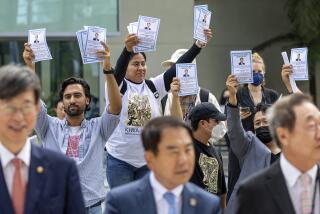Chung Ju Yung; Founder of Hyundai Conglomerate
- Share via
TOKYO — Chung Ju Yung, a onetime construction worker who built Hyundai Corp. into a worldwide conglomerate symbolizing South Korea’s economic miracle, only to see it suffer through a family succession battle and a severe financial crisis at the end of his life, died Wednesday. He was 86.
Chung, who had reportedly been suffering fatigue and weight loss for months and was hospitalized March 2 with pneumonia, had difficulty breathing Wednesday afternoon and died several hours later at a company-owned hospital in Seoul.
In the latter years of his life, Chung forged South Korea’s most significant economic ties with North Korea, where he was born, meeting with North Korean leader Kim Jong Il three times. The business detente helped forge the first summit in June between leaders of the two Koreas, divided more than half a century ago.
Chung’s death leaves the state of his $220-billion conglomerate clouded. Although he officially had retired from the 170,000-employee company, Chung still exerted significant influence behind the scenes.
The chaebol, as massive Korean business group owners are called, has a range of interests in autos, engineering, shipbuilding and semiconductors. The heavily indebted company is soon to be divided into three autonomous groups run by creditors. It has been under heavy pressure from the South Korean government and President Kim Dae Jung to reform.
The cronyism with which it has long been charged was highlighted by a family feud last year, in which two of Chung’s sons struggled for control of the corporation.
Chung mediated the dispute at the publicly traded company, anointing his fifth son, Mong Hun, chairman of Hyundai’s electronics division, as group co-chairman. The eldest living son, Mong Koo, serves as chairman of the Hyundai Motor Group, and another son, Mong Jun, serves as advisor to Hyundai Heavy Industries.
Chung--who was known for walking to work with his seven sons at the crack of dawn and working 16-hour days--was born into a poor farming family in what is now North Korea in 1915.
He is said to have sold his father’s cow, running away with the money and selling rice from a bicycle in Seoul, when he was 16. He was drawn by the lure of construction work--a more lucrative alternative to the backbreaking work he saw his farmer father doing--and eventually started a car repair shop that grew into the auto maker and then other businesses.
His career was tainted by legal difficulties. He was seen as having colluded with South Korea’s former authoritarian leaders. In 1992, he ran for president but came in third. He stood trial for alleged election law violations and was found guilty of diverting $81 million in Hyundai money to his campaign and sentenced to three years in prison. His sentence was suspended because of his age, although other Hyundai officials were imprisoned.
South Korea’s business leaders were calling for a mass business funeral for Chung. “We hope the Hyundai group management and the family will honor his will and try to build Hyundai Group into a prosperous business,” the Korean Chamber of Commerce and Industry said.
President Kim said, “For a long time to come, the Korean people will remember the contributions [Chung] made to the nation’s economic development.”
To help bridge the North-South divide, Hyundai spearheaded a $942-million Mt. Kumgang tourism project in 1998 to take South Koreans by ship to the revered mountain range in the North that is a symbol of longing for Koreans. The venture, however, has been foundering amid waning tourist interest.
Chung donated hundreds of cows--which he personally escorted across the heavily militarized border that divides the Koreas--to help the impoverished North.
Chung is survived by his wife, six of seven sons and a daughter.
More to Read
Inside the business of entertainment
The Wide Shot brings you news, analysis and insights on everything from streaming wars to production — and what it all means for the future.
You may occasionally receive promotional content from the Los Angeles Times.










